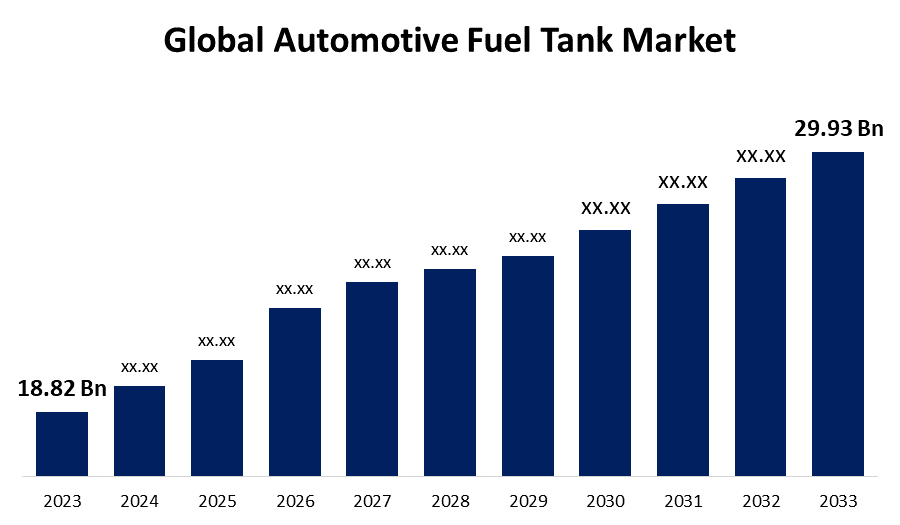Global Automotive Fuel Tank Market Size To Exceed USD 29.93 Billion By 2033 | CAGR of 4.75%
Category: Automotive & TransportationGlobal Automotive Fuel Tank Market Size To Exceed USD 29.93 Billion By 2033
According to a research report published by Spherical Insights & Consulting, the Global Automotive Fuel Tank Market Size is to grow from USD 18.82 Billion in 2023 to USD 29.93 Billion by 2033, at a Compound Annual Growth Rate (CAGR) of 4.75% during the projected period.
Get more details on this report -
Browse key industry insights spread across 200 pages with 110 Market data tables and figures & charts from the "Global Automotive Fuel Tank Market Size, Share, and COVID-19 Impact Analysis, By Capacity (Less Than 45 Liters, 45-70 Liters, above 70 Liters), By Material (Aluminium, Plastic, Steel), By Vehicle Type (Passenger Car, Light Commercial Vehicle, Heavy Commercial Vehicle), and By Region (North America, Europe, Asia-Pacific, Latin America, Middle East, and Africa), Analysis and Forecast 2023 – 2033" Get Detailed Report Description Here:https://www.sphericalinsights.com/reports/automotive-fuel-tank-market
The growing need for automobile gasoline tanks as global vehicle sales rise is creating a positive market picture. As a result, an increase in consumer demand for personal transportation options is driving market growth. Furthermore, individuals are looking for easy and efficient means to get from one place to another for business, pleasure, or entertainment. Aside from that, there is a growth in demand for upgraded automobile gasoline tanks. People prefer cleaner, more fuel-efficient vehicles. In addition, automotive OEMs invest a large amount of money in research to find and develop lightweight materials for manufacturing automotive components that reduce vehicle weight. Since recently, the automotive industry has shifted away from traditional metal tanks and toward plastic tanks. Plastic tanks have been the preferred option of car manufacturers due to their various inherent advantages over metal gasoline tanks, and they are gaining acceptance in the market. However, people's growing preference for zero-emission automobiles, combined with stringent government mandates to minimize fuel emissions and promote environmentally friendly vehicles, may limit market growth over the forecast period.
The less than 45 liters segment is expected to hold the largest share of the global automotive fuel tank market during the anticipation timeframe.
Based on the capacity, the global automotive fuel tank market is categorized into less than 45 liters, 45-70 liters, and above 70 liters. Among these, the less than 45 liters segment is expected to hold the largest share of the global automotive fuel tank market during the anticipation timeframe. The majority of passenger vehicles, including hatchbacks and sedans, have gasoline tank capacities of less than 45 liters. Passenger car sales and manufacturing are skyrocketing over the world due to urbanization, high population rates, improving living standards, and advances in automotive technology. The increase in disposable income is increasing people's desire to purchase a new car.
The plastic segment is expected to grow at the fastest CAGR during the anticipation timeframe.
Based on the material, the global automotive fuel tank market is categorized into aluminium, plastic, and steel. Among these, the plastic segment is expected to grow at the fastest CAGR during the anticipation timeframe. Most plastic gasoline tanks are composed of high-density polyethylene (HDPE). These tanks are lightweight and easily built to suit OEM specifications. Plastic gasoline tanks are in more demand than metal fuel tanks, resulting in increased demand for HDPE. Plastic gasoline tanks are utilized in almost every vehicle type, including passenger cars, light trucks, and big trucks.
The passenger car segment is expected to hold a significant share of the global automotive fuel tank market during the anticipation timeframe.
Based on the vehicle type, the global automotive fuel tank market is categorized into passenger car, light commercial vehicle, heavy commercial vehicle. Among these, the passenger car segment is expected to hold a significant share of the global automotive fuel tank market during the anticipation timeframe. Automobile makers prioritize the development of lightweight gasoline tank materials for passenger cars. For every 100 kilometres travelled, a reduction of up to 100 kg saves between 0.3 and 0.5 litres of gasoline. Lightweight vehicles enhance vehicle performance while reducing fuel emissions.
Asia Pacific is projected to hold the largest share of the global automotive fuel tank market over the anticipation timeframe.

Get more details on this report -
Asia Pacific is projected to hold the largest share of the global automotive fuel tank market over the anticipation timeframe. Growing industrialization and infrastructure development in Asia and Oceania are driving commercial vehicle growth. Furthermore, vehicle manufacturing and production are rapidly rising due to foreign direct investment in Thailand, Malaysia, and Vietnam. As vehicle production grows, so does the demand for automobile fuel tanks throughout Asia and Oceania.
North America is expected to grow at the fastest CAGR growth of the global automotive fuel tank market during the anticipation timeframe. The increased focus on creating specialised fuel storage solutions for hydrogen-powered cars. Furthermore, strict pollution regulations are fuelling industrial growth. Furthermore, increased public demand for larger cars, such as SUVs and pickup trucks, is propelling market growth.
Major vendors in the global automotive fuel tank market are Magna International Inc., YAPP Automotive Parts Co. Ltd., SMA Serbatoi S.P.A., Yachiyo Industry Co., Continental AG, Kautex Textron GmbH & Co. KG, TI Automotive Inc., The Plastic Omnium Group, Martinrea International Inc., Unipres Corporation, and others.
Key Target Audience
- Market Players
- Investors
- End-users
- Government Authorities
- Consulting and Research Firm
- Venture capitalists
- Value-Added Resellers (VARs)
Recent Developments
- In December 2023, Toyota Motor Corporation cooperated with UBE Corporation to develop a novel polyamide 6 resin named UBE NYLON 1218IU. This innovative resin is used as a plastic liner material in the high-pressure hydrogen tank of Toyota's new Crown fuel-cell vehicle. The nylon 6 resin passes stringent requirements for preventing hydrogen leaks in the FCV's high-pressure hydrogen tank.
Market Segment
This study forecasts revenue at global, regional, and country levels from 2020 to 2033. Spherical Insights has segmented the global automotive fuel tank market based on the below-mentioned segments:
Global Automotive Fuel Tank Market, By Capacity
- Less Than 45 Liters
- 45-70 Liters
- Above 70 Liters
Global Automotive Fuel Tank Market, By Material
- Aluminum
- Plastic
- Steel
Global Automotive Fuel Tank Market, By Vehicle Type
- Passenger Car
- Light Commercial Vehicle
- Heavy Commercial Vehicle
Global Automotive Fuel Tank Market, By Regional
- North America
- US
- Canada
- Mexico
- Europe
- Germany
- UK
- France
- Italy
- Spain
- Russia
- Rest of Europe
- Asia Pacific
- China
- Japan
- India
- South Korea
- Australia
- Rest of Asia Pacific
- South America
- Brazil
- Argentina
- Rest of South America
- Middle East & Africa
- UAE
- Saudi Arabia
- Qatar
- South Africa
- Rest of the Middle East & Africa
About the Spherical Insights & Consulting
Spherical Insights & Consulting is a market research and consulting firm which provides actionable market research study, quantitative forecasting and trends analysis provides forward-looking insight especially designed for decision makers and aids ROI.
Which is catering to different industry such as financial sectors, industrial sectors, government organizations, universities, non-profits and corporations. The company's mission is to work with businesses to achieve business objectives and maintain strategic improvements.
CONTACT US:
For More Information on Your Target Market, Please Contact Us Below:
Phone: +1 303 800 4326 (the U.S.)
Phone: +91 90289 24100 (APAC)
Email: inquiry@sphericalinsights.com, sales@sphericalinsights.com
Contact Us: https://www.sphericalinsights.com/contact-us
Need help to buy this report?
